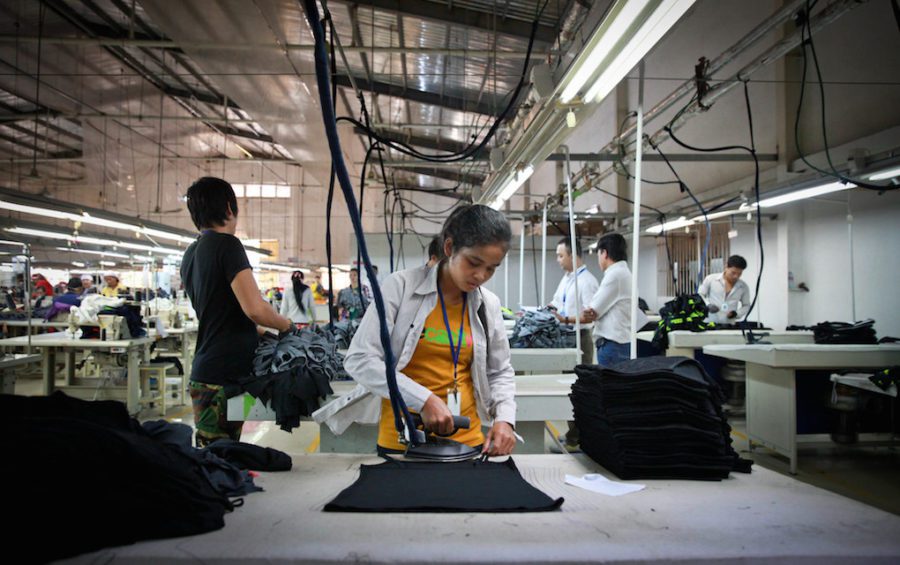UPDATED — Nearly 100,000 workers’ jobs are in danger as garment factories suspend employees amid the ongoing economic fallout of the Covid-19 pandemic, with a Labor Ministry official predicting garment exports will nosedive this year.
In a press conference at the Council of Ministers building this week, ministry spokesman Heng Sour said garment exports during the first three months of the year were only 80 percent of what they were in the same period last year.
Sour estimated that international orders from Cambodia could decline by as much as 50 to 60 percent in the second quarter, compared to the same period in 2019.
“Some buyers are willing to continue to pay for what has already been produced, even though it has not been exported,” Sour said on Monday. “But based on our contacts with buyers, they dare not confirm what they will buy in April, May and June.”
More than 130 garment factories have submitted requests to the government to suspend operations, impacting an estimated 100,000 of the approximately 800,000 people employed in the sector, according to Sour.
On Wednesday, Cambodia reported no new cases of Covid-19 for the 17th consecutive day, but the country’s economy, which is highly dependent on international buyers, is still contending with the impacts of the novel coronavirus pandemic.
The garment sector was initially plagued by a lack of raw materials imported from China when the virus ravaged Cambodia’s biggest trade partner in the first two months of the year, but international buyer orders of Cambodia-made clothes and shoes have declined significantly in recent months, after the E.U. and U.S., two major export destinations, enforced lockdown orders and other restrictions on movement, and consumer demand plunged.
Stefan Pursche, senior manager of media relations for Adidas, did not answer questions about the firm’s orders in Cambodia, but he said company representatives were discussing Covid-19’s impacts on orders with manufacturers and trade unions.
“In order to adjust to the current situation, we are working in close collaboration with our partners to shift some of the orders to the second half of the year,” Pursche said in an email. “We try to avoid the cancellation of orders. Our efforts include a commitment to pay for all orders completed, or in process.”
H&M spokeswoman Ulrika Isaksson said in an email on Thursday that the company continues to place orders with garment manufacturers in Cambodia, although she did not answer questions about recent or future orders.
Isaksson said H&M would abide by contracts and “stand by our commitments and agreements by taking delivery of and pay for already produced goods as well as goods in production, if delivered within a reasonable timeframe.”
Emailed questions to five other international brands that source from Cambodia went unanswered as of Thursday.
Kaing Monika, deputy secretary-general for the Garment Manufacturers Association in Cambodia (GMAC), echoed Sour’s assessment, noting that retail markets in countries that buy Cambodia-made clothing have been heavily impacted by pandemic-related economic disruptions.
“We also agree that in April and May, [exports] will really fall,” Monika said on Monday.
The Commerce Ministry, GMAC as part of the Sustainable Textile of Asian Region Network and labor unions sent separate letters to international brands this month, asking them to honor orders already produced or in production, and consider the impacts of canceling or reducing orders on Cambodia’s economy and workforce.
Ken Loo, GMAC’s secretary-general, said factories can apply to partially or fully suspend operations, but they cannot compel brands to place new orders.
“The appeal that we sent was not an appeal to place more orders. It was an appeal to uphold existing contractual obligations,” he told VOD on Wednesday.
While Loo said he was concerned that some buyers had canceled existing orders, he also suggested that factories may be able to attract new orders if they can offer competitive prices.
While acknowledging the weight that buyers hold over garment workers’ employment, Cambodian Labor Confederation president Ath Thorn called on the government and factory owners to uphold their responsibility to workers, by assisting with their health care needs and compensating suspended workers in line with guidelines set this month, such as offering suspended workers $70 a month in compensation. The monthly minimum wage for garment workers is $190.
“The challenge in the short term is that workers are losing their jobs for two to three months,” Thorn said. “So, all parties have to find a strategy to answer this short-term challenge.”
Additional reporting by Danielle Keeton-Olsen
Updated on April 30, 2020 at 4:05 p.m. with comments from H&M spokeswoman Ulrika Isaksson.
(Translated and edited from the original article on VOD Khmer)













